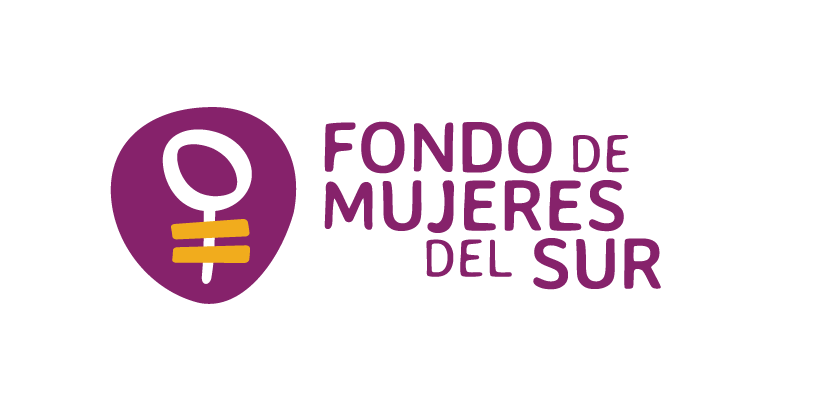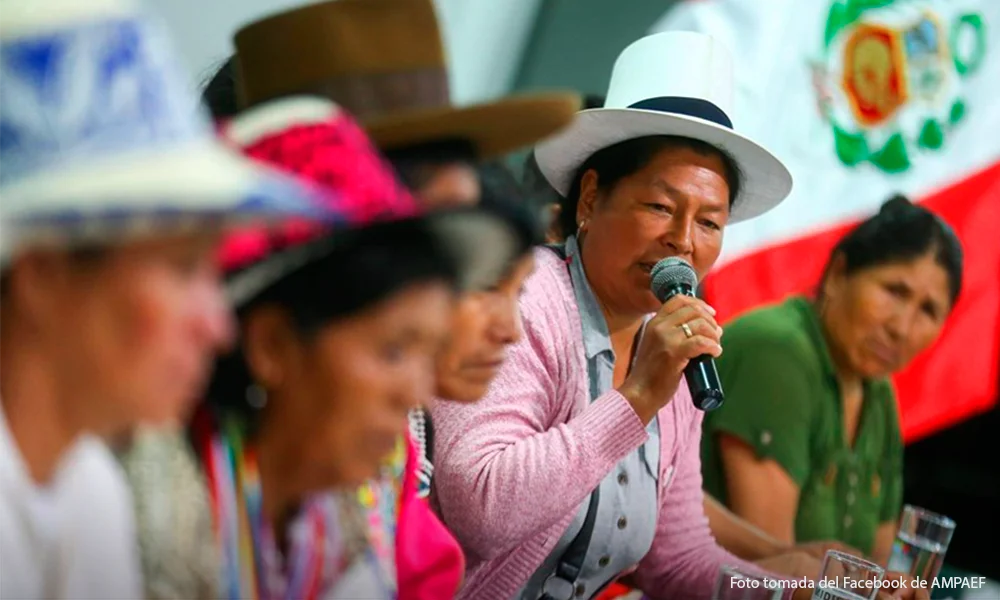We asked Vero Ferrari to write about AMPAEF (Association of Peruvian Women Affected by Forced Sterilisations), a national organisation of women who suffered first-hand, and to this day live with the consequences of, a public policy that violated their physical integrity, their lives and threatened their reproductive freedom.
Escribe Vero Ferrari*
Translated by Christina Hamilton
Rute Zúñiga gives us a little of her time on a Saturday in the middle of a market where she is selling her agricultural products to maintain her household. She looks like any other woman among many who make multiple efforts to survive with their families, but Rute is the president of AMPAEF, Association of Peruvian Women Affected by Forced Sterilisations. That is, she is one of the almost 300,000 women that were sterilised in the midst of the massive logistical deployment of a genocidal state policy planned, directed, celebrated and that still goes unpunished by the dictatorship of Alberto Fujimori in the 90s, more precisely between 1996 and 2001, called the National Program for Reproductive Health and Family Planning.
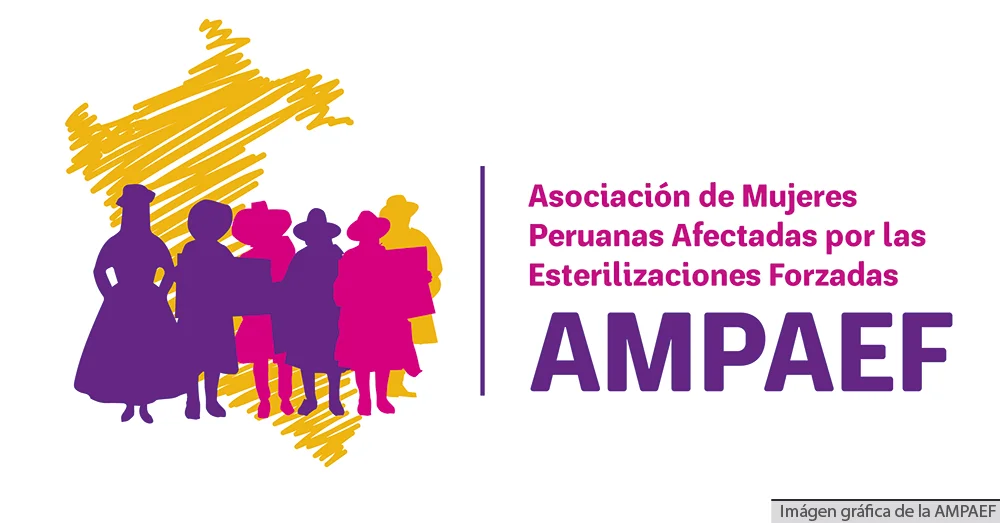
If it had not been for the first complainants, women from Anta (Cusco), where Rute comes from; for the spontaneous self-organisation of many of these women throughout Peru to confront the violation of their human rights; and for the feminist investigations, particularly by Giulia Tamayo, a Peruvian lawyer who, in 1998, revealed what was happening when she published the report entitled “Nada Personal. Reporte de Derechos Humanos sobre la Aplicación de la Anticoncepción Quirúrgica en Perú 1996-1998” (Nothing Personal. Human Rights Report on the Application of Surgical Contraception in Peru 1996-1998 ) [1]; then the life and health of thousands of indigenous, peasant and Quechua-speaking women would have continued to be affected by politicians, officials and health workers who to this day have not been sanctioned. Such is the case of former Health Ministers Eduardo Yong Motta, Marino Costa Bauer and Alejandro Aguinaga. The latter is even now a congressman for the Fujimori party, demonstrating, once again, how little some lives matter.
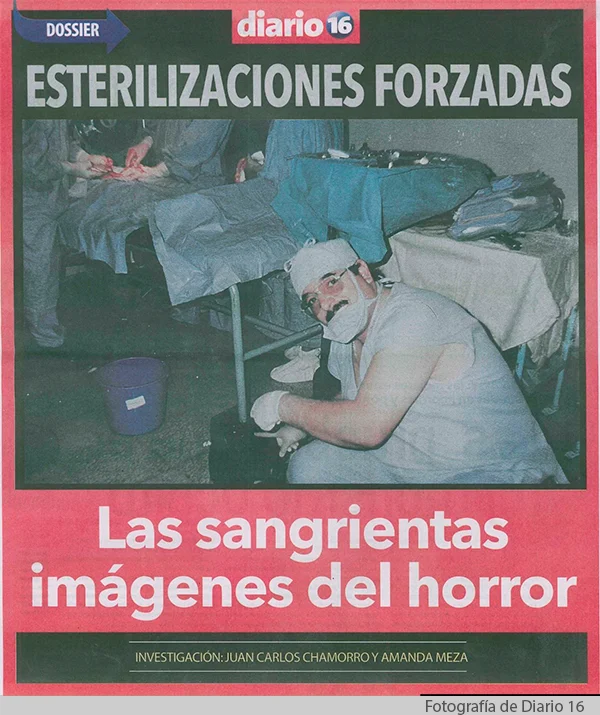
Behind Alberto Fujimori’s political speech in Beijing [2], in which he stated his objective to be that “women would be owners of their bodies” and that this would reduce poverty in Peru, there was a more ominous plan: to exterminate the poor, in this case, the very poorest women.
Almost three decades later, the publically declared objective was never met: the female victims of forced sterilisations not only did not escape poverty, but were plunged deeper into it, they had to endure the pain of a forced, abusive, careless and negligent surgical operation; the pressures and humiliations of medical personnel who appealed to the banality of evil to complete their daily quotas of surgical interventions; the torturous and chronic consequences of physical and mental health until the end of their time; and, those who did not die, the radical change in their life plans, often adding to family and social contempt, the abandonment of their partners in several cases, post-traumatic stress and their ongoing legal processes, as well as the lack of comprehensive reparation on the part of each government in power.
In times when audio-visual material is vital to generate indubitable evidence of human rights violations, the documentary “Nada Personal (Nothing Personal)” [3] was able to record the testimonies of women who had been sterilised a few days before in Huancabamba (Piura) in a Campaign of Surgical Contraception on November 22 and 23, 1996. The horrifying images speak for themselves.
There were 18 fatalities caused by the forced sterilisations promoted by Alberto Fujimori, his ministers and his advisers. Two of them became emblematic cases of the way in which the Fujimori government manipulated, deceived, forced, abandoned and then forgot women: Celia Ramos (Piura, 1996) and Mamérita Mestanza (Cajamarca, 1997). They embodied the crimes committed by the Peruvian State: serious injuries, injuries followed by death, manslaughter, exposure to danger, kidnapping, coercion, embezzlement, concealment, failure to report and omission of responsibilities. In 2021, 19 years after beginning the preliminary investigations, a judge finally held the first hearing on charges in the case of forced sterilisations against 1,307 aggrieved men and women. To date, more than five hearings have been held, in a slow process that is revictimising.
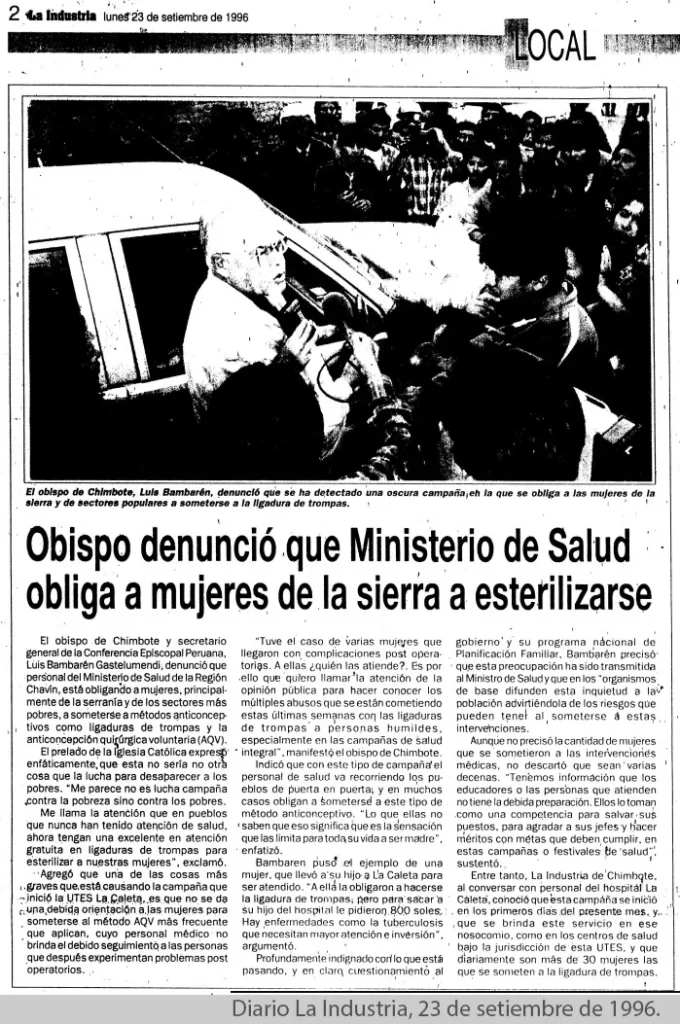
At the end of the 90s, twelve women from Anta travelled to Lima to denounce the violation of their human rights through forced sterilisations. This sparked the process of self-organisation of the victims. They called themselves AMPAEF (Association of Women Affected by Forced Sterilisations), finding each other in various towns and districts. Currently there are 14 organisations from various regions of Peru such as Ayacucho, Cajamarca, Cusco, Huancavelica, Lima, Callao, Loreto, Piura, San Martín. In 2015, they were recognised as female victims and they were registered in the REVIESFO (Registry of Victims of Forced Sterilisation), a registry administered by the Ministry of Justice and Human Rights, created to identify the number of people affected by this disastrous public health policy. There are more than 8,000 women registered.
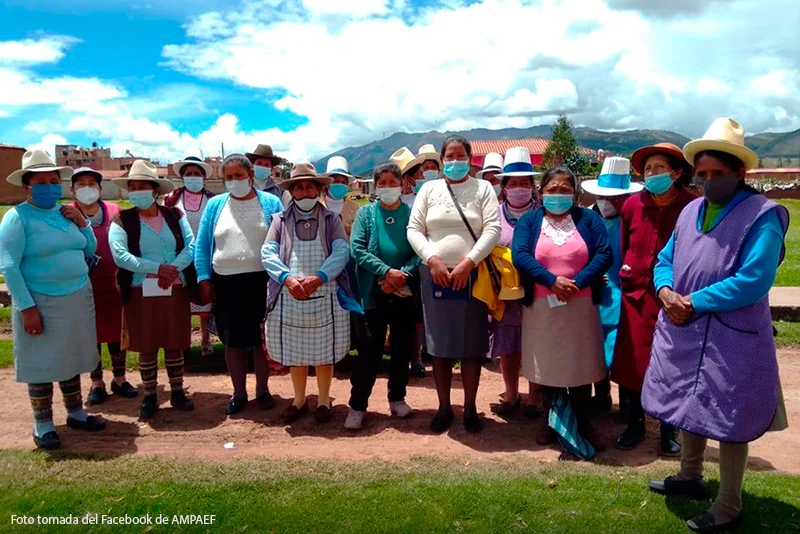
They meet once a month in a general assembly, after their own local meetings. Together, the women of Anta coordinate their future activist activities and agree on ways to collaborate with their colleagues who are sick. They have formed a group to be able to make themselves heard in the face of an indolent State, but also to resist together the vicissitudes they are going through.
Rute tells us how their cases are progressing: “We are requesting that forced sterilisations be included amongst the grounds for the extradition of Alberto Fujimori in the Supreme Court of Chile. We have six cases lodged with CEDAW (Committee on the Elimination of Discrimination against Women)** and three with the UN Non-Discrimination Committee. What we want is for progress to be made, we want comprehensive reparation and that at least we get enough money for our illnesses.”
They know too well why their cases do not advance in the Peruvian Judiciary: corruption, the continuous changes of judges and prosecutors, and the Fujimorism that has been established in the highest power spheres have caused the resolution of the cases to be delayed, the judicial process has been pigeon-holed several times and impunity continues after 27 years. They also know how politicians use their case, always close to elections: “Every authority, every president who comes in, makes us promises, they use us to be able to say that they are going to launch our case, that they are going to do this or that, but once they are elected, they don’t even remember us, when we ask for a meeting they don’t accept to see us, and we are left thinking that they have mistreated us before and we continue to be mistreated,” says Rute.
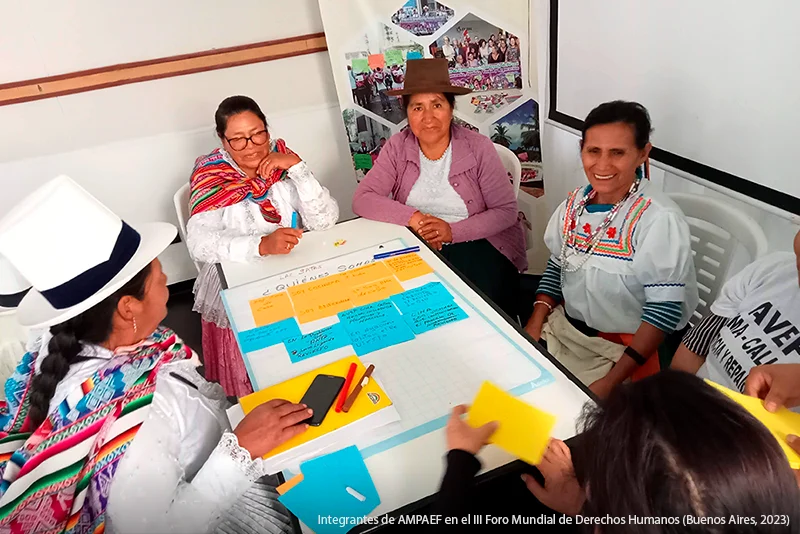
The work done by AMPAEF has not been easy nor that of its spokeswomen. For decades they have faced the denialism of Fujimori party members, right-wing politicians, and even publications [4] that deny that it was a state policy intended to harm them. The brutality of a health policy continues with its current accomplices who have political, economic and academic power, and belong to the social elites who seek to maintain the state of colonialism that allowed this type of crime.
“The authorities don’t want to listen to us, Quechua-speaking indigenous peasant women, but we are going to continue fighting,” says Rute. They hope that the Peruvian State will ask for forgiveness and make reparations at the highest level.
Meanwhile, access to some resources has allowed them to get training, create their School of Leaders called Warmikuna Sayaynin (Mujeres valientes en resistencia) (Brave Women in Resistance), prepare materials to raise awareness about their cases and, above all, travel to the locations where they need to be to demand their rights. The story of dignity of AMPAEF women continues, they are not alone.
“With the grant from Fondo de Mujeres del Sur our members from other places where they could not travel have been able to travel and we have had enough for our activities, the funding is highly necessary, it has made it easier for us to organise ourselves a little more, now we are more united, more organised and we are going to continue with our fight, prior to the grant we could not travel anywhere, we could not go to the marches to protest, as simple as that we could not go, where would we get the money from, because what we grow in the fields does not get a good price, we do not have a higher education. With the training we are making ourselves become heard more,” says Rute.
The struggle led by AMPAEF women is recognised nationally and internationally. In 2021, the Ministry of Women and Vulnerable Populations awarded the “Order of Merit for Women” to 14 presidents of the association. Just a few hours before finalising this article we learned that the International Centre for the Promotion of Human Rights CIPDH-UNESCO has chosen Rute Zúñiga to present the Annual Award to Human Rights Defenders.
May her story and that of thousands of women who are still calling for justice be heard, repaired and appreciated, because their lives are worth as much as any other life.
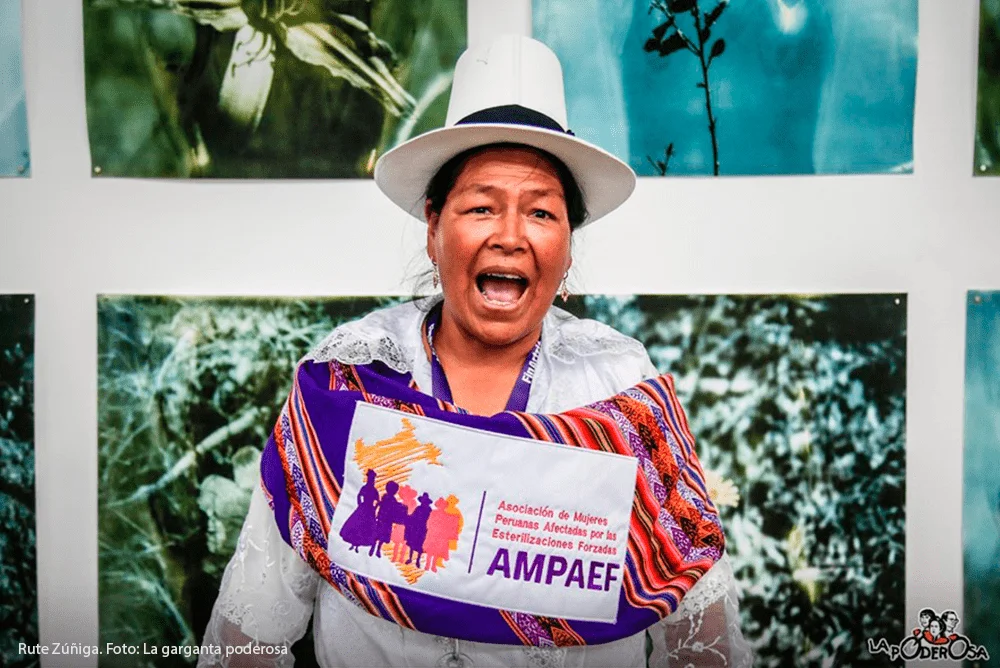
Donate now and support women building lives free from violence!
(*) Vero Ferrari is a linguist, writer, film-maker, film programmer and editor of the news website called Mano Alzada. She coordinates the Miguelina Acosta Library, the Salita de CIN/E and the Dissident Memory Archive.
(**) In October 2024, CEDAW admitted a favourable resolution for five of the cases filed by AMPAEF in 2020. CEDAW recognised the sterilisation programme was a form of intersectional discrimination, which disproportionately affected indigenous, economically disadvantaged and rural women. Furthermore, it emphasized that the Peruvian State failed in their obligations to properly investigate these violations and to adequately compensate the victims of forced sterilizations. The Committee launched an urgent appeal to the Peruvian State to accelerate and expand their investigations, provide financial compensation and psychological support, and implement a comprehensive reparations programme for the victims.
More information: https://www.ohchr.org/es/press-releases/2024/10/peru-fujimori-governments-forced-sterilisation-policy-violated-womens-rights
AMPAEF is a grantee organisation supported by Fondo de Mujeres del Sur, within the framework of the Leading from the South (LFS) consortium. More information about LFS: https://www.mujeresdelsur.org/en/our-programs/leading-from-the-south/
[1]“Nada Personal. Reporte de Derechos Humanos sobre la Aplicación de la Anticoncepción Quirúgica en Perú 1996-1998” (“Nothing Personal. Human Rights Report on the Application of Surgical Contraception in Peru 1996-1998”): https://1996pnsrpf2000.files.wordpress.com/2011/07/cladem_nada-personal.pdf
[2] The 1995 Fourth World Conference on Women, held in Beijing, China, was one of the most important events on women’s human rights, as the proposals of the three previous conferences were consolidated in the Beijing Declaration and the Platform for Action which were adopted by 189 countries. That space was used strategically by Alberto Fujimori, who attended the conference and launched his family planning campaign. For more information see: https://www.un.org/es/conferences/women/beijing1995 y https://elpais.com/diario/1995/09/12/sociedad/810856806_850215.html
[3] “Nada personal (Nothing personal)” was the documentary directed by Carlos Cárdenas, who accompanied Giulia Tamayo throughout her investigations: https://www.youtube.com/watch?v=c0QIYcrUazs
[4] Such as the case of the book “La verdad de una mentira. El caso de las trescientas mil esterilizaciones forzadas (The truth of a lie. The case of the three hundred thousand forced sterilisations)” (2017) by María Cecilia Villegas, which seeks to reduce the responsibility of the Fujimori government in cases of human rights violations by placing the focus on the coldness of the design of a public health policy with limitations and on the responsibility of health personnel.
